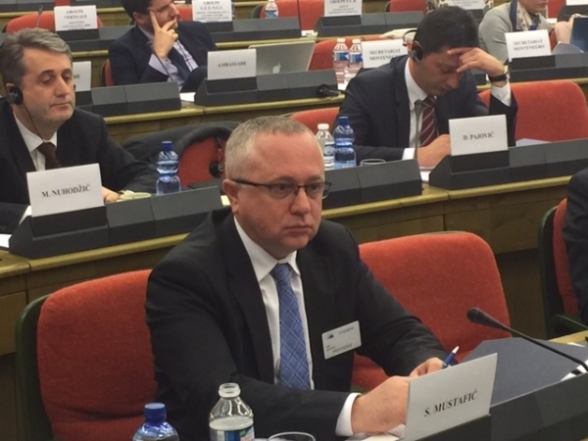Vice President of the Parliament of Montenegro Mr Suljo Mustafić spoke at the meeting of the Stabilisation and Association Parliamentary Committee on the topic “Rule of Law and Electoral Legislation in Montenegro”.
Addressing the SAPC members, Vice President Mustafić said that through constant legislative activity in the Parliament of Montenegro a series of laws had been adopted related to the rule of law, including the fields of judiciary, fight against corruption, and human rights.
- The rule of law and strengthening institutions of the legal state represent a key prerequisite to healing of a society. The Parliament is the source of legislative power, but it also must demonstrate its ability to monitor the implementation of laws. Mechanisms of mutual control of powers in all three branches need to be strengthened, because each of them need to be within the competencies provided for in the Constitution and laws, said Mr Mustafić.
Mr Mustafić also pointed out the problem of lack of adequate judicial epilogue when it comes to war crimes cases committed on the territory of Montenegro or against its citizens, which was also emphasised in the European Commission report.
- This is an important issue and resolving it requires repeated prosecutorial and judicial prosecution, believes Mr Mustafić.
Vice President of the Parliament of Montenegro Mr Suljo Mustafić submitted an amendment as follows: “Expresses concern due to the lack of fair judicial epilogue when it comes to war crimes cases; Points out the need for consideration of opportunities of repeated prosecution by the Prosecution Office, as well as strengthening of the professional capacities of the institution; Invites the European Commission to support the project of establishment of the Centre for Research and Documentation of War Crimes in order to execute the Conclusion of the Parliament of Montenegro.”
Speaking of work on electoral legislation, Mr Mustafić said that, after the agreement of party leaders, there was establishment of the Working Group of Parliamentary Dialogue on Preparing Free Elections.
- We are discussing several topics regarding creation of conditions for organising democratic elections with results that would not be challenged. The readiness of competent institutions for conducting elections, and the control of the state resources in order to prevent their misuse, are also being considered, as well as the issue of media scene and their conduct in the election campaign, said Mr Mustafić.
Mr Mustafić said that they were discussing in a very constructive atmosphere with active participation of NGO sector and representatives of the European Commission in attendance.
- Trust in the election process, through full transparency of the election process and validity of results of the elections are the most significant goals, and to pursue them we need a parliamentary dialogue of political subjects, which entails a body of broad participation and involvement of all subjects. In all the future stages, all parliamentary parties should be involved in that dialogue, and for now we have absence of some of the political subjects, said Me Mustafić. He said that “we are interested in unity and systemic approach to implementing solutions, because that is the only way we can ensure full accountability of everyone in the election process - political subjects participating in the elections, parliamentary committee monitoring the implementation of laws and media conduct, control of the state resources and certainly, relation of state institutions which participate in their legal implementation”.
- We believe that the organising of the next elections, in accordance with the new legislation, is an important goal for all political subjects. Validity of their election results will represent a new democratic step forward and incentive for achieved results in the Euro-Atlantic integration of our country, concluded Mr Mustafić.








